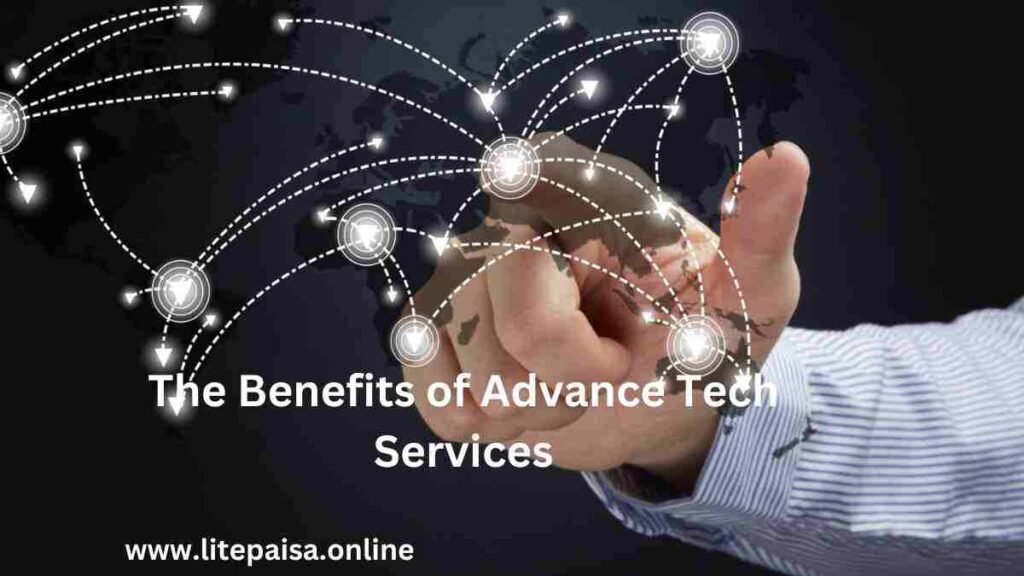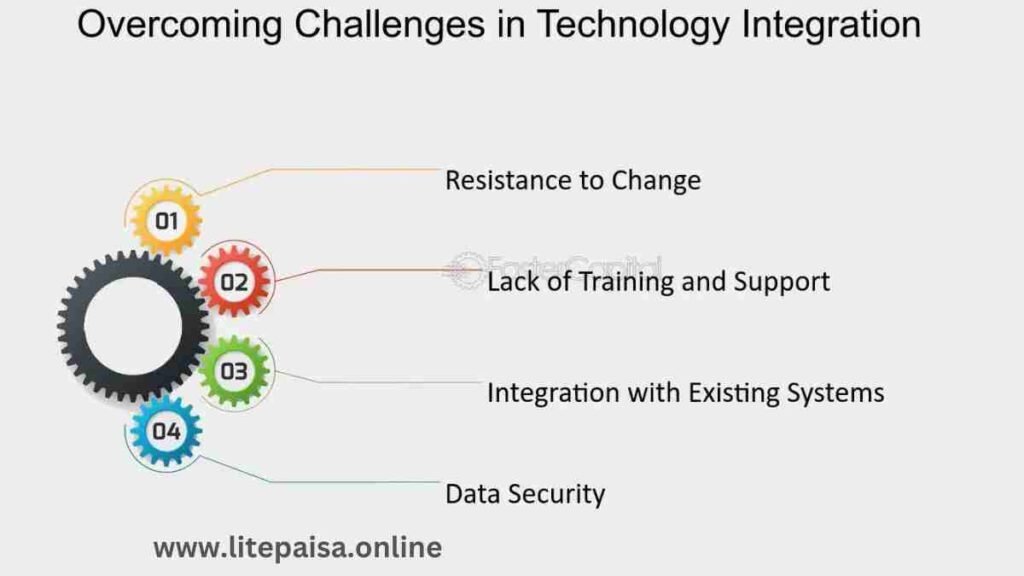
Advance Tech Services In today’s fast-paced world, advanced technology services have become indispensable for businesses striving to stay ahead of the curve. From cloud computing to artificial intelligence, these services empower companies to innovate, optimize operations, and deliver exceptional value to customers. In this article, we delve deep into the realm of advanced tech services, exploring the latest trends, benefits, and how they can revolutionize your business.
1. Understanding Advance Tech Services

Advanced tech services encompass a broad range of offerings that leverage cutting-edge technology to solve complex business challenges. Advance Tech Services These services are designed to provide businesses with the tools and expertise needed to drive innovation, enhance productivity, and maintain a competitive edge. Key components include:
a. Cloud Computing
Cloud computing is a cornerstone of modern technology services, enabling businesses to access and store data over the Internet rather than relying on local servers. By leveraging cloud services, companies can reduce IT overhead, improve collaboration, and ensure data security.
b. Artificial Intelligence and Machine Learning
AI-powered tools can analyze vast amounts of data to identify patterns, predict trends, and optimize operations. Machine learning algorithms, on the other hand, enable systems to learn and improve over time, driving continuous innovation.
c. Cybersecurity Solutions Advance Tech Services
As businesses become increasingly digital, cybersecurity has emerged as a critical component of advanced tech services. Advanced cybersecurity solutions include encryption, multi-factor authentication, and real-time threat detection, ensuring that your business is safeguarded against cyber threats.
d. Internet of Things (IoT)
IoT technology is revolutionizing industries such as manufacturing, healthcare, and logistics by providing real-time insights and automating routine tasks. By integrating IoT devices into their operations, businesses can enhance efficiency, reduce costs, and improve customer experiences.
e. Blockchain Technology
Blockchain technology is reshaping industries by providing a decentralized, secure, and transparent way to record transactions. Originally developed for cryptocurrencies like Bitcoin, blockchain is now being used in various sectors, including supply chain management, finance, and healthcare. The technology’s ability to ensure data integrity and prevent fraud makes it a valuable asset for businesses.
2. The Benefits of Advance Tech Services

Investing in advanced tech services offers numerous advantages for businesses, including:
a. Enhanced Efficiency
By automating routine tasks and optimizing processes, advanced tech services help businesses operate more efficiently. This increased efficiency leads to cost savings, faster time-to-market, and the ability to allocate resources to more strategic initiatives.
b. Improved Decision-Making Advance Tech Services
With access to real-time data and advanced analytics tools, businesses can make more informed decisions. AI and machine learning, in particular, provide valuable insights that help companies anticipate market trends, understand customer behavior, and identify new opportunities.
c. Greater Flexibility and Scalability
Cloud computing and other advanced tech services offer businesses the flexibility to scale their operations up or down based on demand. This agility is particularly valuable in today’s dynamic business environment, where companies must quickly adapt to changing conditions.
d. Enhanced Customer Experiences
Advanced tech services enable businesses to personalize their offerings and deliver exceptional customer experiences. From AI-powered chatbots that provide instant support to IoT devices that offer real-time insights, these technologies help businesses build stronger relationships with their customers.
e. Competitive Advantage
By leveraging the latest technology, businesses can differentiate themselves from competitors and gain a competitive edge. Advanced tech services allow companies to innovate, respond to market changes more quickly, and deliver superior value to customers.
3. Implementing Advance Tech Services in Your Business

To successfully implement advanced tech services, businesses should follow a strategic approach:
a. Assess Your Needs
The first step is to assess your current operations and identify areas where advanced tech services can add value. Consider your business goals, challenges, and the specific technologies that can help you achieve your objectives.
b. Choose the Right Partners
Partnering with reputable service providers is crucial for the successful implementation of advanced tech services. Look for providers with a proven track record, expertise in your industry, and a commitment to staying at the forefront of technology.
c. Invest in Training and Development
Ensuring that your team is equipped to leverage new technologies is essential. Invest in training and development programs that empower your employees to use advanced tech tools effectively and stay updated on the latest trends.
d. Monitor and Optimize Advance Tech Services
Once advanced tech services are implemented, continuous monitoring and optimization are key. Regularly review your systems, gather feedback, and make necessary adjustments to ensure that your technology investments are delivering the desired results.
4. Future Trends in Advance Tech Services

As technology continues to evolve, several emerging trends are poised to shape the future of advanced tech services:
a. Edge Computing
This approach reduces latency, improves speed, and enhances the performance of applications, particularly those that require real-time processing.
b. Quantum Computing
Quantum computing represents the next frontier in computing power. While still in its early stages, quantum computers have the potential to solve complex problems that are beyond the capabilities of traditional computers. Industries such as finance, healthcare, and logistics are likely to benefit from this revolutionary technology.
c. 5G Technology Advance Tech Services
The rollout of 5G networks is expected to revolutionize the way businesses operate by providing faster, more reliable internet connections. This technology will enable the widespread adoption of IoT devices, enhance remote work capabilities, and support the development of new, innovative applications.
d. AI and ML Advancements
As AI and machine learning technologies continue to advance, we can expect even greater automation, improved decision-making, and more personalized customer experiences. Businesses that stay ahead of these trends will be well-positioned to thrive in the future.
5. Overcoming Challenges in Implementing Advanced Tech Services

While the benefits of advanced tech services are clear, implementing them comes with its own set of challenges.
a. Cost Management
One of the primary concerns for businesses is the cost associated with implementing advanced tech services. The initial investment in new technology, infrastructure, and training can be substantial. To manage these costs, businesses should:
- Prioritize Investments: Focus on technologies that offer the most significant impact on your business goals. Start with small, scalable projects and expand as you see returns on investment.
- Explore Financing Options: Look into financing options, grants, or partnerships that can help offset the cost of implementation.
- Leverage Cloud Services: Cloud-based solutions often offer a pay-as-you-go model, allowing businesses to scale their usage based on need, reducing upfront costs.
b. Data Security and Privacy Advance Tech Services
As businesses adopt more advanced tech services, ensuring the security and privacy of data becomes increasingly important. The integration of AI, IoT, and cloud services introduces new vulnerabilities that must be addressed. To mitigate these risks:
- Implement Strong Security Protocols: Utilize encryption, multi-factor authentication, and regular security audits to protect sensitive data.
- Stay Compliant: Ensure that your technology solutions comply with industry standards and regulations, such as GDPR or HIPAA, to avoid legal repercussions.
- Educate Employees: Regular training on security best practices can help prevent breaches caused by human error.
c. Integration with Existing Systems
Another challenge businesses face is integrating new technologies with existing systems. Legacy systems may not be compatible with advanced tech services, leading to inefficiencies or disruptions in operations. To overcome this:
- Conduct a System Audit: Assess your current IT infrastructure to identify potential compatibility issues. This audit will help you plan the integration process more effectively.
- Consider Hybrid Solutions: In some cases, hybrid solutions that combine old and new technologies can bridge the gap, allowing for a smoother transition.
- Work with Experienced Partners: Partnering with experienced tech service providers can help navigate the complexities of integration and ensure that new technologies are seamlessly incorporated into your operations.
6. The Role of Leadership in Advance Tech Services Adoption

The successful adoption of advanced tech services requires strong leadership. Business leaders play a crucial role in driving technological innovation and fostering a culture that embraces change.
a. Vision and Strategy
Leaders must have a clear vision for how advanced tech services will support the organization’s goals. This vision should be communicated effectively to all stakeholders, ensuring everyone understands technology adoption’s strategic importance.
- Develop a Technology Roadmap: Outline the steps your business will take to implement advanced tech services over time, aligning them with your overall business strategy.
- Set Measurable Goals: Establish key performance indicators (KPIs) to track the success of your technology initiatives and adjust your strategy as needed.
b. Fostering a Culture of Innovation
Creating a culture that encourages innovation is essential for the successful implementation of advanced tech services. Leaders should:
- Encourage Experimentation: Foster an environment where employees feel comfortable experimenting with new technologies and approaches.
- Promote Continuous Learning: Support ongoing education and professional development to keep your team updated on the latest technological advancements.
- Recognize and Reward Innovation: Acknowledge and reward employees who contribute innovative ideas or successfully implement new technologies.
c. Change Management
Introducing advanced tech services often requires significant changes in processes, workflows, and employee roles. Effective change management is critical to minimizing disruption and ensuring a smooth transition.
Communicate Clearly: Keep employees informed about upcoming changes, their reasons, and how they will benefit the organization.
Monitor Progress: Regularly review the implementation process, gather feedback, and make adjustments as needed to ensure a successful adoption.
Conclusion
In today’s digital age, advanced tech services are no longer optional—they are essential for businesses looking to thrive in a competitive landscape. By embracing these technologies, companies can unlock new opportunities for growth, efficiency, and innovation. Whether it’s through AI, IoT, cloud computing, or cybersecurity, the potential of advanced tech services is vast. The key to success lies in strategic planning, strong leadership, and a commitment to continuous improvement.
Visit Here: Cloud Future Trends




